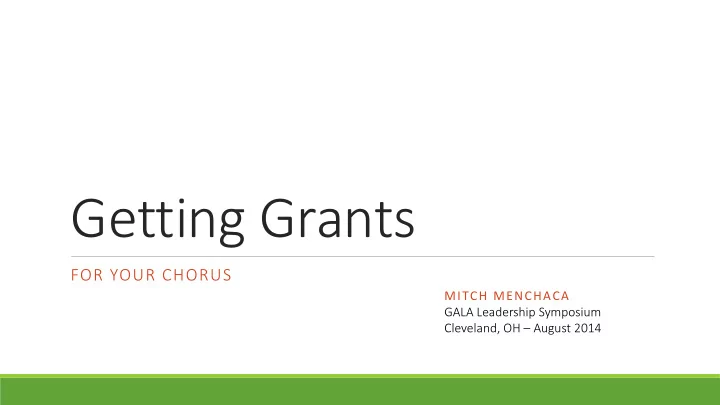

Getting Grants FOR YOUR CHORUS MITCH MENCHACA GALA Leadership Symposium Cleveland, OH – August 2014
Today’s Session PLANNING FROM A GRANTMAKER’S PERSPECTIVE TIPS AND IDEAS FROM A GRANTSEEKER’S PERSPECTIVE
Part I GRANTMAKER’S PERSPECTIVE
Panel Comments Applicant Doesn’t Seem to Know their Audience/Community Budget Discrepancies – Don’t Notate any Variances Not Giving Me a Complete Picture Horrible Support Materials – Too Bad Coming from a Chorus
Program Officer Comments Didn’t Follow the Directions I Don’t Have a Relationship – They Never Contacted Me Did NOT Complete a Final or Interim Report They Turned in the Same Application as Last Year
Grants Process FOLLOW- FOLLOW- REASON PLANNING APPLYING UP THRU
Why a Grant? REASON WHY?
Types of Grants PROJECT GRANTS GENERAL OPERARTING SUPPORT PLANNING SPECIAL INITIATIVES
Your Application YOUR IDENTITY YOUR STORY APPLYING YOUR PLAN YOUR FINANCES YOUR PROOF
What Happens Next? YES FOLLOW- NO THRU MAYBE
You’re Not Done Yet COMPLETE PROJECT FOLLOW- EVALUATE UP REPORT
Grants Process Recap FOLLOW- FOLLOW- REASON PLANNING APPLYING UP THRU
Part II GRANTSEEKER’S PERSPECTIVE *This section created in tandem with Chorus America board member Susan Reardon. Susan is the Director of Gift Planning with the LA Philharmonic.
A Successful Grant Advances a Major Initiative or a Strategic Goal Allows Your Organization to Build Capacity Builds a Trust Relationship with Funder Raises the Organizational Profile in the Community
Challenges with Grants Lack of Clarity in Funder’s Expectations Change of Project — How to Manage Schedule and Deliverables Reporting Requirements Metrics-based funding Change in Funder’s Program Priorities or Staff Multi-Year Projects and Renewal Grants What happens when your organization becomes too reliant on foundation support?
Relationships with Program Officers “Informational” Meetings Building Trust: Listening and Communication Style Site Visits Change in Program Staff Grant Proposals, Reports and “Stewardship”
Top 10 Tips 10. Institutional and personal integrity is KEY to building a relationship of trust. 9. In times of change, communicate early and often to institutional funders and emphasize transparency. 8. Reports aren’t just an obligation: it’s another opportunity to educate and build trust. 7. Never assume that support will be renewed – complacency is your enemy! 6. Look for opportunities for the funder to see your chorus in action. Trust the power of your music.
Top 10 Tips 5. You can learn from grant denials. With some funders, multiple applications are required to be successful. PATIENCE! 4. Everything you present to a grantmaker must convey your organization’s impact and how their support will enhance your mission. 3. Every meeting with a grantmaker is a chance to learn: LISTEN as well as ADVOCATE! 2. Research is only as good as it is current and updated. 1. Do your research — focus your effort on those funders whose mission aligns most closely with yours.
Thank You Q & A MITCH MENCHACA Chief Operating Officer mitch@chorusamerica.org Chorus America www.chorusamerica.org
Recommend
More recommend